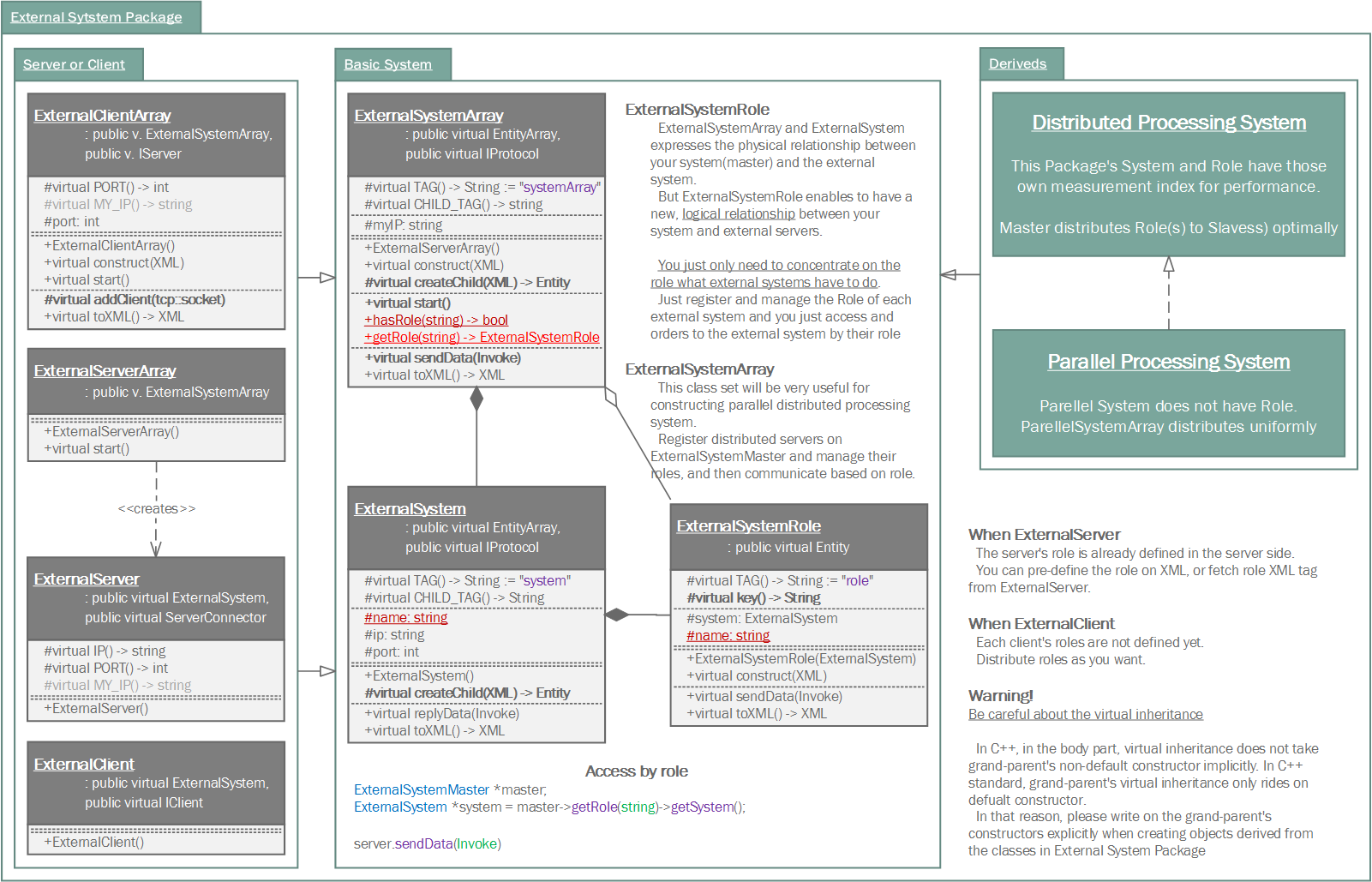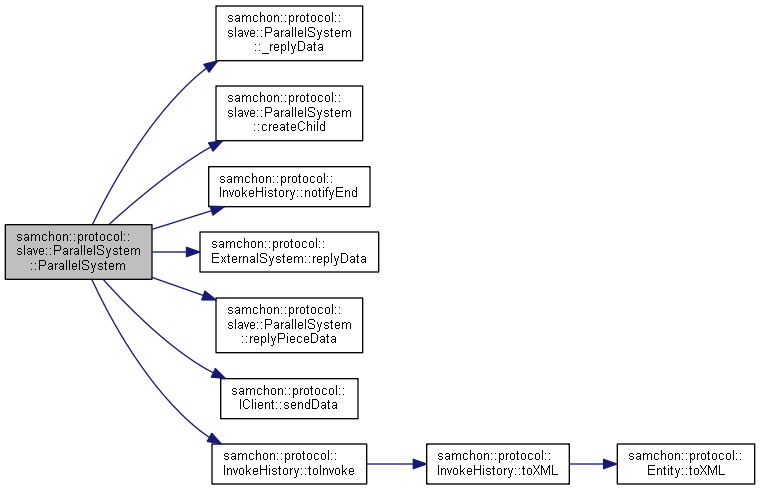|
Samchon Framework for CPP
1.0.0
|
|
Samchon Framework for CPP
1.0.0
|
A slave parallel system. More...
#include <ParallelSystem.hpp>

Public Member Functions | |
| ParallelSystem () | |
| Default Constructor. More... | |
| virtual void | replyPieceData (std::shared_ptr< Invoke >, size_t, size_t)=0 |
| Handle requested processes which are segmented. More... | |
 Public Member Functions inherited from samchon::protocol::slave::SlaveSystem Public Member Functions inherited from samchon::protocol::slave::SlaveSystem | |
| SlaveSystem () | |
| Default Constructor. More... | |
 Public Member Functions inherited from samchon::protocol::ExternalSystem Public Member Functions inherited from samchon::protocol::ExternalSystem | |
| ExternalSystem () | |
| Default Constructor. More... | |
| virtual void | construct (std::shared_ptr< library::XML >) override |
| Construct data of the Entity from an XML object. More... | |
| virtual void | start ()=0 |
| Start interaction. More... | |
| virtual auto | key () const -> std::string override |
| Get a key that can identify the Entity uniquely. More... | |
| virtual void | replyData (std::shared_ptr< Invoke >) override |
| Handling replied message from an external system. More... | |
| virtual auto | TAG () const -> std::string override |
| A tag name when represented by XML. More... | |
| virtual auto | CHILD_TAG () const -> std::string override |
| A tag name of children. More... | |
| virtual auto | toXML () const -> std::shared_ptr< library::XML > override |
| Get an XML object represents the EntityGroup. More... | |
 Public Member Functions inherited from samchon::protocol::EntityGroup< _Container, _ETy, T > Public Member Functions inherited from samchon::protocol::EntityGroup< _Container, _ETy, T > | |
| EntityGroup () | |
| Default Constructor. More... | |
| auto | has (const std::string &key) const -> bool |
| Indicates whether a container has an object having the specified identifier. More... | |
| auto | get (const std::string &key) -> value_type & |
| Access the element by specified identifier(key). More... | |
| auto | get (const std::string &key) const -> const value_type & |
| Access the const element by specified identifier(key). More... | |
 Public Member Functions inherited from samchon::protocol::Entity Public Member Functions inherited from samchon::protocol::Entity | |
| Entity () | |
| Default Constructor. More... | |
 Public Member Functions inherited from samchon::protocol::IEntityGroup Public Member Functions inherited from samchon::protocol::IEntityGroup | |
| IEntityGroup () | |
| Default Constructor. More... | |
 Public Member Functions inherited from samchon::protocol::IClient Public Member Functions inherited from samchon::protocol::IClient | |
| IClient () | |
| Default Constructor. More... | |
| virtual void | listen () |
| Listens message from a related system. More... | |
| virtual void | sendData (std::shared_ptr< Invoke >) |
| Sends message to a related system. More... | |
 Public Member Functions inherited from samchon::protocol::IProtocol Public Member Functions inherited from samchon::protocol::IProtocol | |
| IProtocol () | |
| Default Constructor. More... | |
Protected Member Functions | |
| virtual auto | createChild (std::shared_ptr< library::XML >) -> ExternalSystemRole *override |
| Factory method of a child Entity. More... | |
| virtual void | _replyData (std::shared_ptr< Invoke >) override |
| Pre-processor for segmented processes and reporting elapsed time. More... | |
 Protected Member Functions inherited from samchon::protocol::IClient Protected Member Functions inherited from samchon::protocol::IClient | |
| virtual auto | BUFFER_SIZE () const -> size_t |
| Buffer size of network I/O. More... | |
Additional Inherited Members | |
 Protected Attributes inherited from samchon::protocol::ExternalSystem Protected Attributes inherited from samchon::protocol::ExternalSystem | |
| std::string | name |
| A name can identify an external system. More... | |
| std::string | ip |
| An ip address of an external system. More... | |
| int | port |
| A port number of an external system. More... | |
 Protected Attributes inherited from samchon::protocol::IClient Protected Attributes inherited from samchon::protocol::IClient | |
| Socket * | socket |
| Socket for network I/O. More... | |
| std::mutex * | sendMtx |
| A mutex for sending message. More... | |
A slave parallel system.
ParallelSystem is a class processing segmented Invoke messages from master.
SlaveSystem, literally, means a slave system belongs to a maste system.
The SlaveSystem class is used in opposite side system of master::DistributedSystem and master::ParallelSystem and reports elapsed time of each commmand (by Invoke message) for estimation of its performance.
ExternalSystem is a boundary class interacting with an external system by network communication. Also, ExternalSystem is an abstract class that a network role, which one is server and which one is client, is not determined yet.
The ExternalSystem has ExternalSystemRole(s) groupped methods, handling Invoke message interacting with the external system, by subject or unit of a moudle. The ExternalSystemRole is categorized in a 'control'.

The ExternalSystem class takes a role of interaction with external system in network level. However, within a framework of Samchon Framework, a boundary class like the ExternalSystem is not such important. You can find some evidence in a relationship between ExternalSystemArray, ExternalSystem and ExternalSystemRole.
Of course, the ExternalSystemRole is belonged to an ExternalSystem. However, if you access an ExternalSystemRole from an ExternalSystemArray directly, not passing by a belonged ExternalSystem, and send an Invoke message even you're not knowing which ExternalSystem is related in, it's called "Proxy pattern".
Like the explanation of "Proxy pattern", you can utilize an ExternalSystemRole as a proxy of an ExternalSystem. With the pattern, you can only concentrate on ExternalSystemRole itself, what to do with Invoke message, irrespective of the ExternalSystemRole is belonged to which ExternalSystem.
Definition at line 21 of file ParallelSystem.hpp.
| ParallelSystem::ParallelSystem | ( | ) |
Default Constructor.
Definition at line 12 of file ParallelSystem_slave.cpp.
References _replyData(), createChild(), samchon::protocol::InvokeHistory::notifyEnd(), samchon::protocol::ExternalSystem::replyData(), replyPieceData(), samchon::protocol::IClient::sendData(), and samchon::protocol::InvokeHistory::toInvoke().

|
overrideprotectedvirtual |
Factory method of a child Entity.
EntityGroup::createChild() is a factory method creating a new child Entity which is belonged to the EntityGroup. This method is called by EntityGroup::construct(). The children construction methods Entity::construct() will be called by abstract method of the EntityGroup::construct().
Implements samchon::protocol::EntityGroup< _Container, _ETy, T >.
Referenced by ParallelSystem().

|
overrideprotectedvirtual |
Pre-processor for segmented processes and reporting elapsed time.
You can realize a pre-processing about the replied Invoke message by overriding the IClient::_replyData().
Archiving a history log, filtering and truncating, let handling the message with a new thread, calculating performance by estimating elapsed time about the Invoke message, and so on. Anything you can define pre-processing works before IProtocol::replyData().
| invoke | An invoke message to be pre-processed and shifted to IProtocol::replyData(). |
Reimplemented from samchon::protocol::slave::SlaveSystem.
Referenced by ParallelSystem().

|
pure virtual |
Handle requested processes which are segmented.
| invoke | An invoke message containing segmented process requestments. |
| startIndex | Starting index number of segmentation. |
| size | Size of segmentation. |
Implemented in samchon::protocol::master::ParallelSlaveSystemMediator.
Referenced by ParallelSystem().
